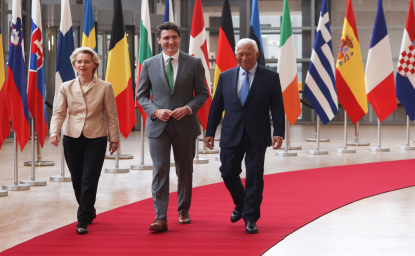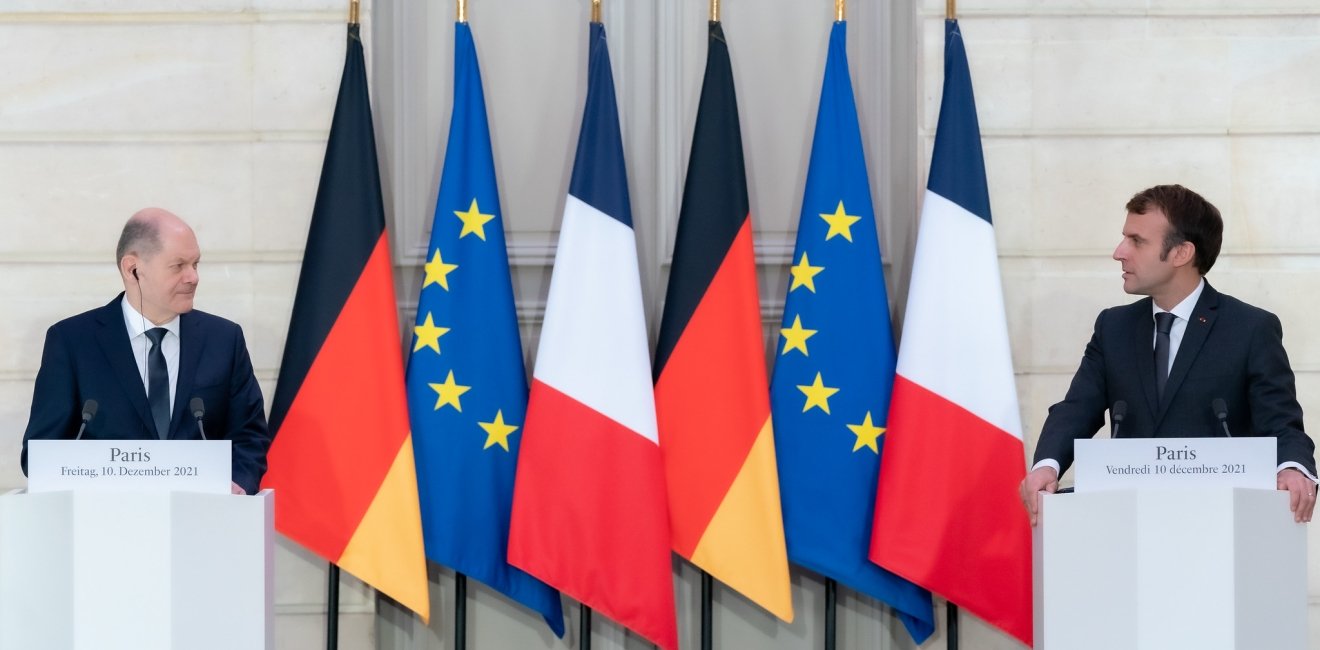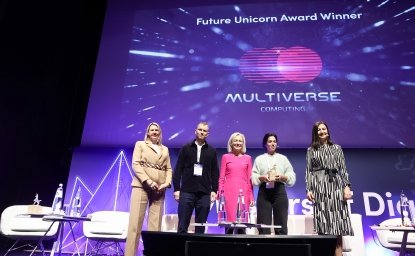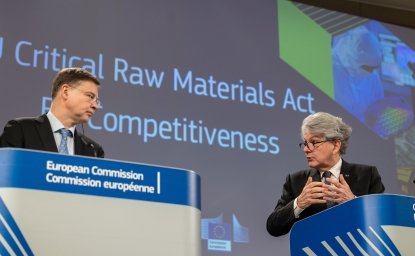Six decades ago, French President Charles de Gaulle and German Chancellor Konrad Adenauer signed a friendship treaty that marked a dramatic turn in the history of their nations. For five centuries, generations of French and German soldiers were either engaged in combat or preparing to do battle with each other. The horrible carnage of World War II convinced de Gaulle and Adenauer to break the perpetual cycle of violence and pledge that war between their countries must never happen again.
The reconciliation between France and Germany transformed ancient enemies into friends. It stands as perhaps the greatest achievement of the European Union. The French—German tandem soon became a powerful motor propelling the quest for greater integration among EU members. Valery Giscard d’Estaing and Helmut Schmidt laid the foundations for a European monetary union that culminated in the euro. François Mitterrand and Helmut Kohl resolved personal differences to embrace German unification and promote the expansion of the Union to embrace the nascent democracies in eastern Europe following the end of the Cold War.
On Sunday January 22, in grandiose ceremonies at Sorbonne University in Paris and the Élysée Palace, French President Emmanuel Macron and German Chancellor Olaf Scholz vowed to instill new impetus into their mission of transforming Europe into an influential superpower that can defend its own interests in an era of renewed big-power rivalry with the United States, China and Russia. Ministers from both governments and more than 300 legislators joined the festivities to celebrate the 1963 Élysée treaty but also consider new strategies to fulfill Europe’s aspirations to become a future global power.
Macron told the audience gathered at the Sorbonne, where he first outlined his own vision for a more dynamic Europe five years ago, that France and Germany had “cleared the path to reconciliation” and must now “become pioneers to relaunch Europe.” He stressed that Europe needed to innovate a new energy policy in the wake of Russia’s war against Ukraine by exploiting tomorrow’s technologies to ensure the European Union emerges as “a geopolitical power in its own right, in defense, space and diplomacy.”
For his part, Scholz said the future of Europe would depend on the “driving force” of Paris and Berlin. “The German-French engine is a machine for compromise: well oiled, but from time to time also loud and marked by hard work,” he said.
In a joint communiqué, both leaders said they would “work together for a European Union that is more resilient, more sustainable and more capable of acting independently.” They would promote this agenda by forging a “strong European foreign and security policy” and by building up “European defense capabilities.” They also promised to work together to reform EU institutions and transform the bloc into a more effective “geopolitical actor.”
“Our objective is the same: a more sovereign and united Europe that is in control of its own destiny,” said Macron told a press conference. Scholz endorsed Macron’s comment and emphasized that “Franco-German co-operation is needed for progress in Europe as a whole.”
Nonetheless, the pomp and ceremony at the anniversary celebration could not mask serious tensions that have roiled French and German relations in recent months. A persistent challenge facing Paris and Berlin is how best to calibrate and coordinate future military aid, including the possible delivery of tanks and heavy armor to Ukrainian forces.
France, like other Western partners, has been frustrated by Germany’s recalcitrance in supplying modern Leopard-2 tanks that are desperately needed by the Ukrainian army. But Scholz has refused to buckle under pressure from the allies, largely because of pacifist elements within his government and Germany’s reluctance to send lethal weapons to areas of conflict, particularly in the former Soviet Union.
Asked whether he would eventually agree to send the Leopards, Scholz would only say that decisions about military aid to Ukraine should be made jointly by the country’s allies. Macron said he had asked the French defense ministry to examine whether to send its own main battle tank, the Leclerc. “Nothing has been ruled out,” he said. “Such decisions will be made with our allies. . . and there will be more work to do in the days and weeks to come.”
But differences over the war in Ukraine are not the only source of friction between Paris and Berlin. A previously planned conclave between the two governments, scheduled for last October, was abruptly cancelled by the French government because French officials said there were disagreements over a range of issues, including how to respond to Russia cutting off natural gas supplies to Europe to the fate of nuclear energy and joint defense projects.
As the European Union expanded to now 27 member states, it has become more difficult for France and Germany to shape the consensus of a more diverse bloc of nations. Russia’s war against Ukraine has only exacerbated various perceptions of the security threat from Moscow: eastern states such as Poland and the Baltic states fear that Russian aggression may soon target them. They have consistently demanded that the West should provide greater supplies of lethal weaponry to Ukraine, even in the face of Russian threats that nations delivering arms to Ukraine may become directly involved in the conflict.
While eastern EU states focus on the Russian menace, southern states such as Italy, Spain and Greece are worried about unchecked immigration from Africa and the Middle East. Those states fear that a surge of immigrants could inflame the dangers of far-right populism destabilizing their countries, a concern shared by France.
Meanwhile, Germany has become much more focused on its own economic fragility. German leaders such as Scholz and Angela Merkel have proved to be mercantilist defenders of German economic interests, rather than far-sighted visions of European unity espoused by their predecessors Schmidt and Kohl. Today, many Germans fear that their once-prosperous economic model, built on cheap Russian gas and lucrative exports to China, has become endangered and could lead the country down the path to economic decline.
Macron has been bitterly disappointed by his failure to align Merkel, and now Scholz, behind his view that Europe must become more politically integrated in order to prevent being picked apart in the great game of nations by Russia, China and the United States. He genuinely fears that unless the European Union can defend its own interests on the world stage, a frenetic race by member states to cut their own separate deals could break the EU apart.
As a result, Macron has touted the 44-nation European Political Community, including non-EU countries like the United Kingdom and Turkey, as a way to build multi-layered forms of cooperation. Macron has developed closer ties through new treaties with Spain, Italy, and Greece. He also plans to meet soon with Prime Minister Rishi Sunak to encourage Britain to play a more cooperative role in European security, even though London is no longer a member of the EU.
Macron’s tactics appear to have captured Germany’s attention. Recently, Scholz has tried to heal the rift with Paris. After deciding in favor of American aircraft for its next jet fighter, Germany has now agreed to join France in the next phase of development for their next-generation fighter, the Future Combat Air System. Berlin has also signed up for a future hydrogen pipeline that is to be built between Spain and France, known as H2Med.
At the anniversary event, French and German ministers also discussed how the EU should respond to the Inflation Reduction Act, US President Joe Biden’s energy package that includes substantial subsidies for everything from electric vehicles to hydrogen technology. Both Paris and Berlin fear that this act will siphon investment in green technology from Europe to the US, which would endanger future jobs and their own economic health.
After months of tensions and recriminations, the pageantry and bonhomie on display in Paris reflect a clear desire on both sides to bury the hatchet and embark on a new phase of close cooperation. France and Germany seem to have recognized that working together is the only way for both countries to achieve the best outcome for themselves, as well as for Europe.
Author

Author "The Last President of Europe: Emmanuel Macron’s Race to Revive France and Save the World"

Global Europe Program
The Global Europe Program is focused on Europe’s capabilities, and how it engages on critical global issues. We investigate European approaches to critical global issues. We examine Europe’s relations with Russia and Eurasia, China and the Indo-Pacific, the Middle East and Africa. Our initiatives include “Ukraine in Europe”—an examination of what it will take to make Ukraine’s European future a reality. But we also examine the role of NATO, the European Union and the OSCE, Europe’s energy security, transatlantic trade disputes, and challenges to democracy. The Global Europe Program’s staff, scholars-in-residence, and Global Fellows participate in seminars, policy study groups, and international conferences to provide analytical recommendations to policy makers and the media. Read more

Explore More
Browse Insights & Analysis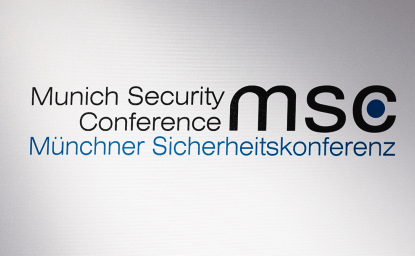
EU-US Alliance Faces Uncertainty: Tensions Over Trade, Security, and Democracy at Munich
